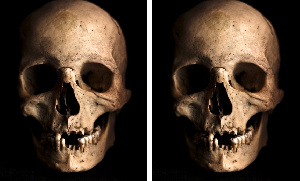‘Burnt’ baby: How parents’ joy was cut short after birth

It was about 2:45pm when baby Yahsmen Kamal Kokroko was born at the Amoah Hospital at Ablekuma in Accra.
“The baby was not crying. She was silent,” her mother, Salamatu Adams, recalled the events of October 21, 2021.
Midwives and parents often anticipate a baby’s first cry in the labour ward because it signals a newborn’s ability to breathe on its own. But, about four hours after her birth, Yahsmen did not cry.
It was the most devastating period for the first-time mother, Salamatu Adams, and her husband, Kamal-deen Kokroko.
Salamatu watched frightfully as the midwife wrapped Yahsmen in a cot sheet screaming “Jesus, Jesus”.
“[The midwife] asked the other staff [in the labour room] to heat water for her. She then pulled out a hot water bottle from a drawer,” Salamatu says.
When the hot water came, Salamatu said the midwife poured it into the hot water bottle, which she then wrapped around the newborn Yahsmen.
With the baby warming up in the cot sheet, the midwife turned to stitch up Salamatu, whose cervix was cut to open her up for the delivery of the baby with a birth weight of 3.5kg.
As she stitched Salamatu’s cervix, Deborah allegedly forgot about the baby tucked in the cot sheet with the hot water bottle.
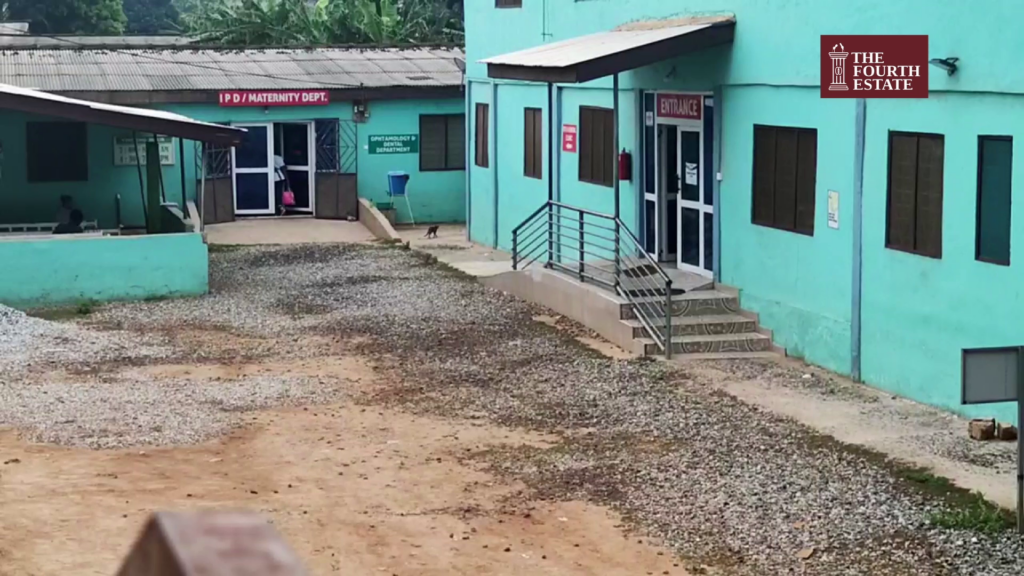
“By the time she realised that the bottle was around the baby, Yahsmen’s skin had burnt,” Salamatu said, recounting her moment of horror. “When I saw it, I screamed.”
The baby’s skin had turned pinkish. What shook Salamatu to the core was when the midwife said Yahsmen was about to die.
“She then peeled the [baby’s scalded] skin and said ‘as for this, if you use Vaseline on it, it’ll heal’ [and then] she applied the Vaseline on the wound,” Salamatu said.
At this point, the midwife bent the baby, forcing her knees to touch her forehead, Salamatu recalled.
The baby let out a shriek, much to the relief of the little crowd in the labour ward. She had taken her first breath of life but all indications were that her first years of life were going to be filled with pain, distress and a lot of hospital visits.
A test of fortitude
Yahsmen is the couple’s first child, born after barely a year of marriage. They were expectant and had gone through so much trouble and anxiety in preparation for the baby.
Salamatu first visited Amoah Memorial Hospital on October 7, 2021, to continue her antenatal care. That was when she first met the midwife, Debora Yeboah.
“The nurses were good,” she told The Fourth Estate.
On her third visit, a scan indicated she was due on October 22, 2021.
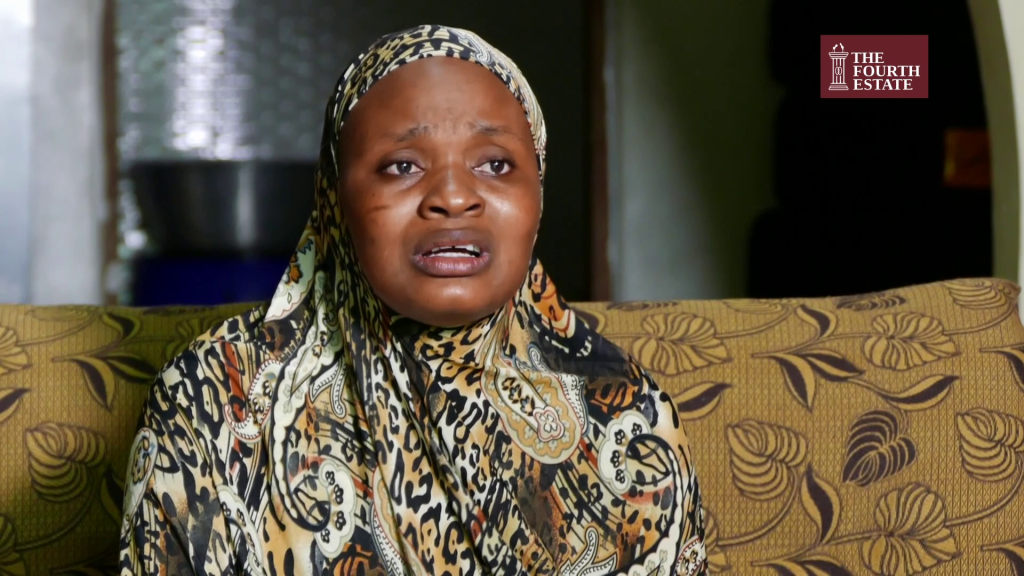
On Wednesday, October 20, 2021, Salamatu went for antenatal care again. Deborah examined the expectant mother and told her that her baby bump was not as pronounced as expected though she could deliver any time soon.
When she returned home, she and her husband washed and cooked. But in the night, Salamatu started experiencing labour pangs. So, her husband rushed her to the hospital that night.
Twelve hours later, she delivered. It was supposed to be a joyous occasion. But it rather became the beginning of a trauma that has ruined the couple’s happiness.
Five-hour surgery
After following the midwife’s advice to use Vaseline, a petroleum jelly used to treat some skin conditions, Salamatu and her husband saw no improvement in the baby’s condition. That was when they decided to seek a second opinion.
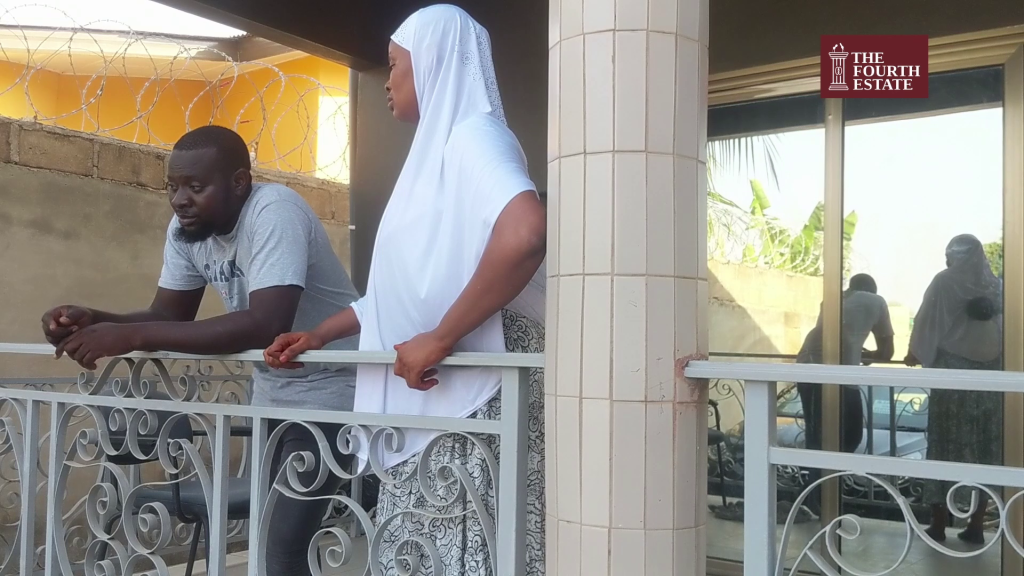
They went to the Ga South Municipal Hospital, on October 27, 2021.
A quick examination of the little girl showed the wound was infected and the doctors recommended surgery. Yahsmen was just six days old – too young to go under the surgeon’s knife.
Medical records from the Ga South Hospital show that the baby suffered 13% burns at Amoah Hospital, where she was born.
“They said the best way was to wait for a while to enable the dead tissue which made the hard skin wear off before they could operate on her,” Salamatu said.
Eventually, on November 4, 2021, baby Yahsmen was taken to the theatre. The procedure lasted five hours.
Four days later, little Yahsmen was discharged from the hospital, and for six weeks, the family shuttled between their Ablekuma home and the Ga South Municipal Hospital at Mallam, also in Accra, for the dressing of the baby’s wound.
The surgery cost the family GHS4,000, which they could only pay with a loan they secured. This is in addition to all the expenses on transportation and medical consumables for dressing the wound.
At just about three years old now, Yahsmen’s burns have left her scarred for life. Her parents, devastated and traumatised by the experience of watching their joy fade into despair, can’t shake off the sense of regret over their choice of Amoah Hospital for the delivery of their first child.
“I have not yet started feeling the love for my baby because I am feeling the pain,” Yahsmen’s father, Kamal-deen told The Fourth Estate in their Ablekuma home. “It has caused me so much pain that when I go to bed, I can’t sleep.”
His wife shared her own pain of seeing her baby suffer.
“I couldn’t take it when they had to inject her hands every day. The hospital staff kept asking how this little baby got burnt? What did I do to her? Even the paediatrician threatened to get me arrested for burning my baby,” Salamatu said.
Saved not burnt – Midwife’s account
In the midst of it all, the couple are having to grapple with the hospital’s refusal to accept responsibility for Yahsmen’s suffering.
Even the midwife who applied the hot water bottle to her delicate skin as a baby, insists she did nothing wrong and that Kamal-deen and Salamatu should be grateful that she pulled their child from the brink of death.
When The Fourth Estate contacted Debora Yeboah, the midwife, she claimed she was not an employee of the Amoah Hospital but rather came around to help.
She claimed she lost the chance of getting a job with the hospital because of the allegations that she was responsible for little Yahsmen’s injuries.
The Fourth Estate had more questions.
“You said you did everything to resuscitate the child, what did you do?”
“Mouth-to-mouth, chest compression,” she said.
“You said you put something behind the child, or?”
“Even with that, she didn’t respond,” she said, and went into another room in search of the hot water bottle but indicated that the hospital’s lawyer had come for it.
“It is like a foam, it’s not something that will burn a child,” she insisted.
“But can hot water be poured inside?”
“Even when we heated the water, it wasn’t hot. Before it went near the baby, I even touched the man’s [Yahsmen’s father’s] body with it and asked him if it was hot. He said no.”
The hospital also has a different account of what happened in the ward where Yahsmen was born.
“Our client (Amoah Hospital) further states that, under no circumstance did the midwife fill a can with hot water and wrapped in a towel at the bare back of the newly born baby,” lawyers for the hospital said in a suit filed by the parents of Yahsmen.
Alien practice
The President of the Midwives Association of Ghana, Mary Ofosu, told The Fourth Estate that the use of the hot water bottle in a labour ward is an alien practice.
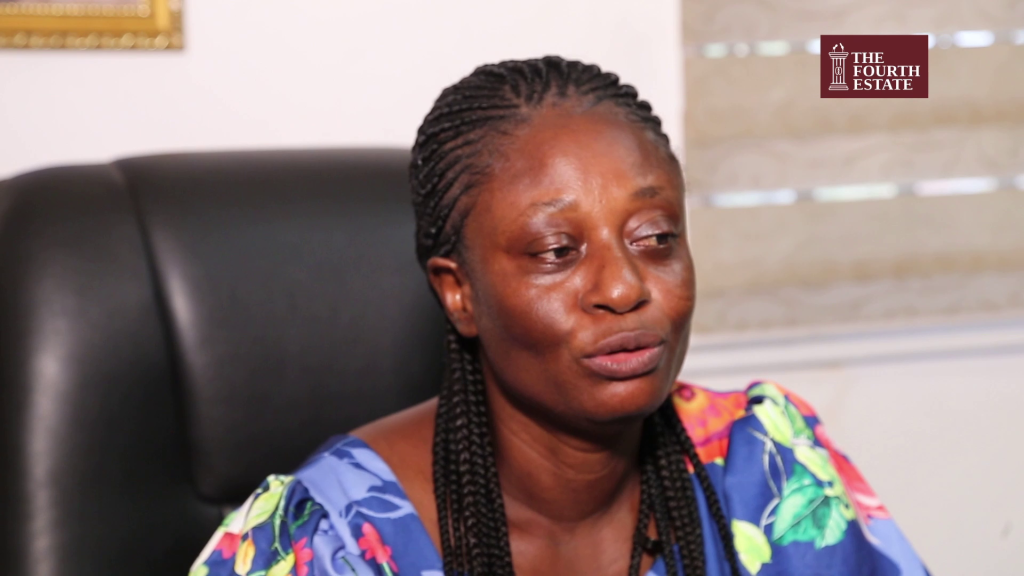
“It’s not part of the protocol,” she said. “I’ve never heard of its use like that. Hot water bottle? You can´t use anything hot on a baby’s’ delicate skin.”
Mrs Ofosu, who has spent a decade and a half in different labour wards, said a hot water bottle was forbidden as a pain soother on even pregnant women.
She said if a newborn baby does not cry within the “Golden Minute”, their first 60 seconds outside of the womb, there are various tried and tested procedures to help them draw breath. They do not include the use of hot water bottles.
Mrs Ofosu said resuscitation could be artificially initiated using a procedure known as bag and mask. Here, the baby is positioned on a firm surface to clear the airway, a sized mask is then attached to the baby’s nose and mouth, and gentle puffs of air is squeezed from the attached bag. The baby’s heart rate, oxygen levels, and overall condition are closely monitored throughout to ensure a heartbeat.
A midwife’s other options in resuscitation include sucking the baby’s mouth and nose or cleaning the baby to stimulate him/her. Chest compressions may also be used.
Did the baby die?
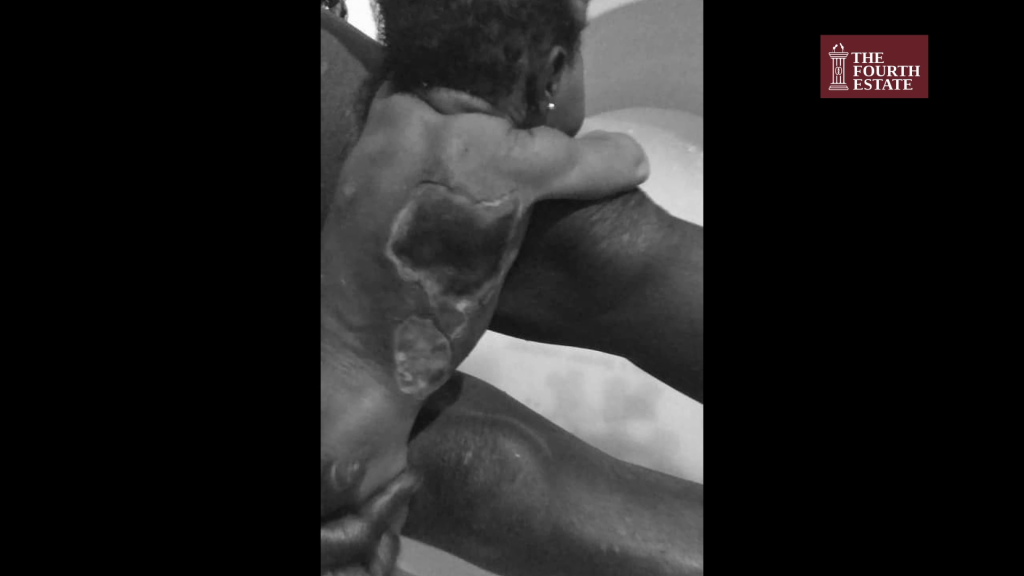
Midwife, Deborah Yeboah, employed none of these techniques but insisted that but for her Yahsmen wouldn’t be alive today.
“When the child arrived, she was dead,” she claimed. “You can ask the man [Yahsmen’s father].”
“When the child was born, she was dead? How?”
“It happens,” she interrupted.
“You can place a dead baby in bed for five hours?”
“She was gone.”
“But how do you keep a dead child for—-?”
“I’ve been delivering babies for 40 years now. I have a lot of experience,” she insisted.
“You said the baby was dead when she was born. What was the colour of her skin?”
“The baby was gone. Unfortunately, those with me didn’t take a picture of her.”
“You said the baby was dead. What showed she was dead?”
“She was lifeless. Her mouth was wide open.”
“But if a baby is born and it dies, what do you do?”
“A doctor comes to assess it.”
“So, for those five hours, the doctor didn’t come?”
“It wasn’t five hours. A doctor came from Ridge to give her a vaccine.”
“So, the baby was there from 2pm till the doctor came at 6pm?”
“She cried at 5pm.”
“Did the doctor see the wound?”
“The doctor doesn’t work here. He came from the Ridge Hospital.”
“How long did the water bottle stay behind [the baby]?”
“I had wrapped her. The father was sitting by her. I didn’t check the time. She was behind me in the cot sheet.”
“How long did it take?”
“It wasn’t that long.”
“When I was suturing [restitching the mother], I was watching the baby. We were praying. A pastor’s wife was around and she was praying with us. I told all of them to pray to see what God can do [for the baby].”
A legal tussle begins
In their quest for justice and some recompense, Salamatu and her husband, Kamal-deen wrote a letter to Amoah Hospital demanding GHS500,000 for negligence on the part of its staff. They intended to use the money to defray the cost of Yahsmen’s treatment.
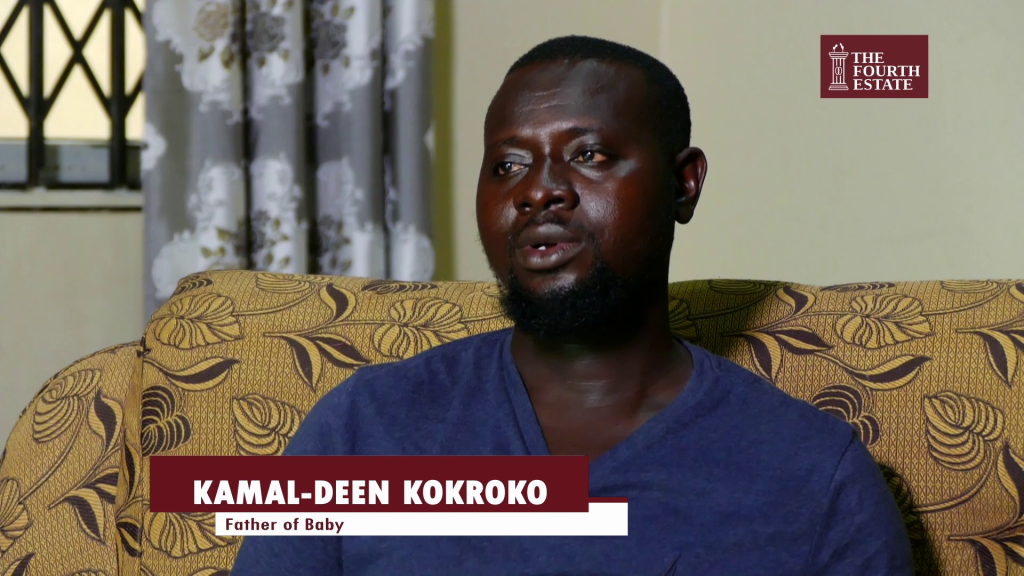
The hospital, through its lawyers, responded that Yahsmen was born with her umbilical cord around her neck, leading to asphyxia (or suffocation) which nearly killed her.
“Our client denies that under no circumstance did the midwife fill a can with hot water and wrapped in a towel at the bare back of the newly born baby,” the letter from Amoah Hospital’s lawyers said. They also claim that Yahsmen’s condition was a result of the asphyxia she had suffered.
“Post-delivery examination of the baby showed that she had a blister at the right flank area about one centimetre by two centimetres.”
The hospital has also rejected the couple’s demand for compensation, insisting like the midwife that they saved Yahsmen’s life.
Dissatisfied with the hospital’s response to their demand letter, Salamatu and Kamal-deen instructed their lawyers to take the matter to court.
In a suit filed on March 18, 2022, they demanded two million cedis from the Amoah Hospital for Yahsmen’s injuries —”Plaintiffs say that the damages they suffered by them was as a result of the negligence of the Defendant which negligence arose from the breach of the duty of care owed to the Plaintiffs by the Defendant and its agents/staff, the writ stated.
Kamal-deen told The Fourth Estate he wanted to use the case to help save others from the ordeal his family has suffered.
“I told myself that if I don’t get justice for my child, some other person could fall victim,” he says. “It’s an experience that I would not want even my worst enemy to go through.”
Source: Seth Bokpe/Adwoa Adobea-Owusu Evans Aziamor-Mensah/The Fourth Estate

